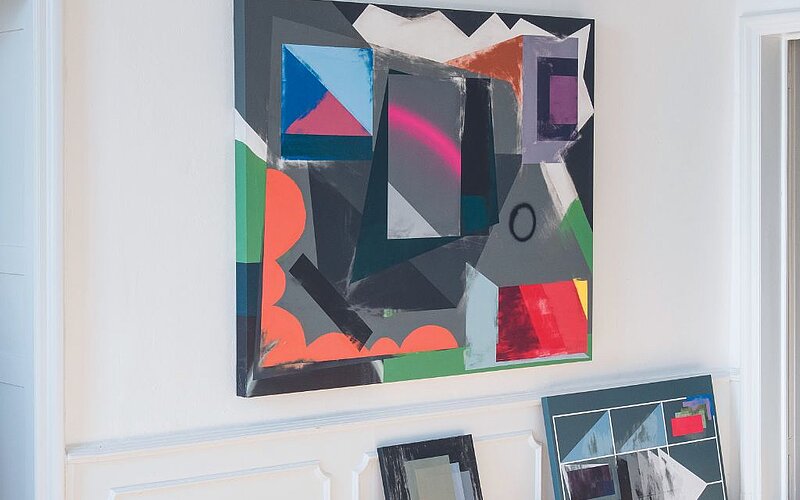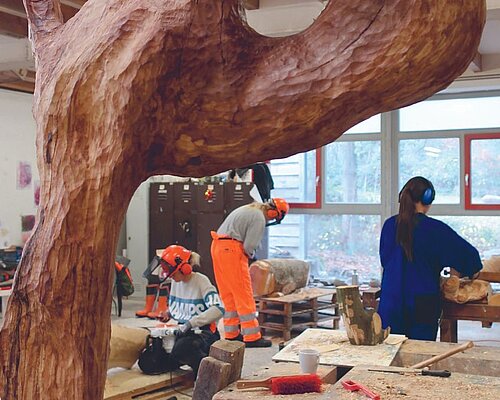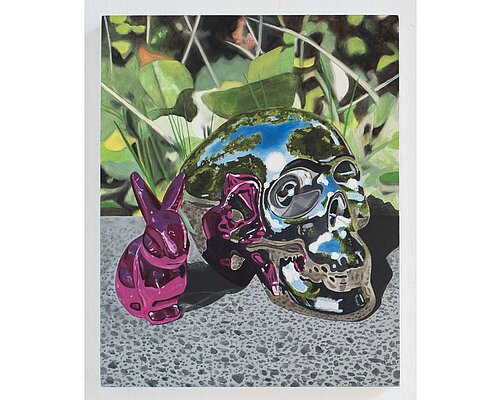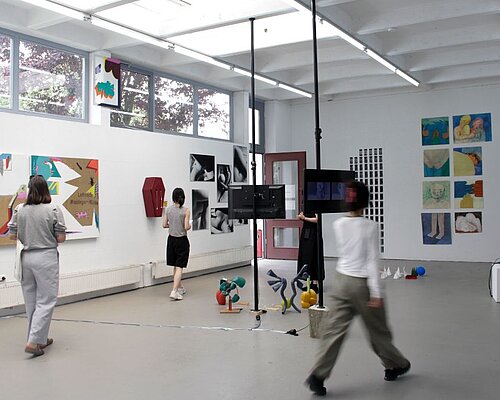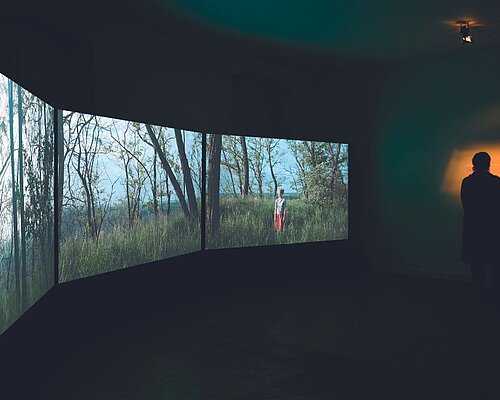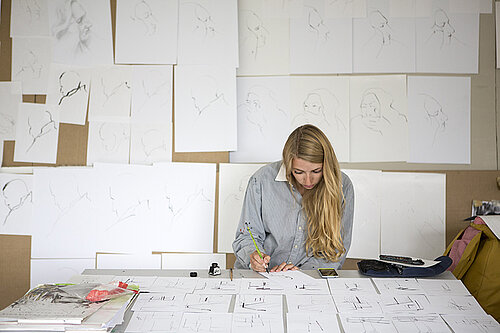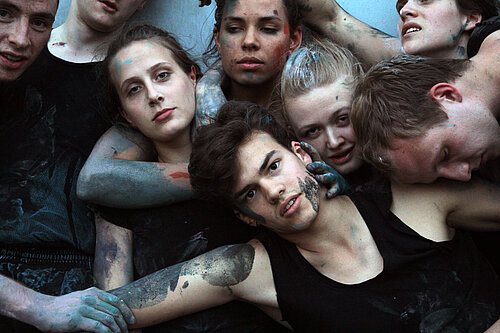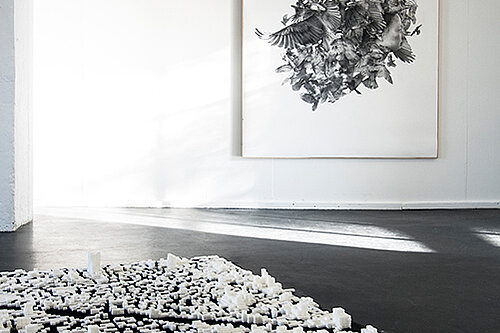
Fine Arts
Bachelor of Fine Arts
The Bachelor's degree programme in Fine Arts is a undergraduate three-year programme that can be completed either full-time (6 semesters) or part-time (10 semesters) and is taught in German.
Students receive a sound fundamental education and have plenty of room for orientation: the aim of the fine arts degree programme is to develop an independent language of images and forms as well as to position students in the field of contemporary fine arts. Working freely, personal responsibility, experimental openness and the teaching of extensive technical, artistic and theoretical skills are the hallmarks of the fine arts study programme.
Students' own artistic plans and projects are a structural element of their learning and work from the very beginning.
Special features of the study of fine arts
Alternative educational programme
With its focus on art and society, the degree programme at Alanus University offers a unique alternative in the educational landscape.
Broad artistic spectrum
The study programme covers all areas of contemporary fine arts: from painting, drawing and graphics, sculpture, artistic photography, digital and time-based media to installation, performance, participatory projects and interventions in public space.
Individual support
Our students are supported by a highly motivated team of professors, lecturers and staff in the orientation area and in all of the 12 specialisation classes. We place great value in creating a constructive, positive working atmosphere. The focus is on the artistic as well as the personal development of the students. Critical faculties and the formation of opinions, sensibilisation for larger social contexts are among the objectives of the teaching programme.
Working environment
In the fine arts programme at Alanus University, all students have their own studio space, which is accessible around the clock. In addition, there are large outdoor areas for sculptural work. There is also a state-of-the-art media workshop with computer workstations and a photo studio, as well as various workshops.
Location
Campus I - Johannishof is close to nature and guarantees a quiet and concentrated working atmosphere. The art centres of the Rhineland are in the immediate vicinity and can be reached in a short time.
Internationality
Study trips lasting several days and international projects take place regularly. In addition, students can spend semesters abroad at selected partner universities. The art programme is popular with students from all over the world, so international encounters and exchanges can take place on campus.
Interdisciplinary approach
In seminars and lectures of the cultural studies supplementary programme Studium Generale, students from all disciplines learn together. Interdisciplinary projects provide new perspectives.
Practical relevance and professional orientation
The students regularly realise and document exhibitions inside and outside the university. During their fine arts studies, students are already encouraged to participate in competitions and public projects. Internships, e.g. with established artists, guarantee insights into everyday professional life.
In this way, the Bachelor's degree programme Fine Arts prepares students for various freelance careers and professional orientations: In addition to working as a freelance visual artist, students can also pursue numerous art-related professions or take further Master's degree programmes.
Course Contents and Structure
Elementary Artistic Modules
In the first year of the fine arts degree programme, the elementary artistic modules focus on the teaching of fundamental artistic skills and basic theoretical knowledge. These include an introduction to the various painting techniques, sculptural and plastic work, artistic photography, video and moving image, sound, image editing and digital working methods as well as drawing and print graphics. In the free studio time, students develop their individual artistic work.
The course content is taught in module form, with each module concluded with a course-related examination. A joint final exhibition at the end of the second semester concludes the orientation phase.
Artistic advanced modules
In the second and third year of study, students work in classes with professors of their own choice, in which various and wide-ranging artistic focal points are offered. The main focus in this stage of learning in studying fine arts is on deepening and individualising aesthetic questions within one's own artistic design process and the gradual further development of one's own artistic work.
Structure of the fine arts study programme
- Studio time:
Time in the studio forms the core of the fine arts programme and takes up most of the time; students work freely and independently here. - Colloquium:
Here the students meet with the professors for weekly, joint picture discussions. Individual discussions are also part of the programme. - Workshop:
Practice-oriented interdisciplinary workshops on various working techniques are offered to round off the free work. - Aesthetics:
Theoretical seminars on aesthetic and art historical issues as well as excursions complete the curriculum. - Internship:
Students gain valuable practical experience through an internship of several weeks in an artistic or art-related professional field. - Bachelor's thesis:
A joint public exhibition at the end of the sixth semester concludes the Bachelor's programme in Fine Arts. The final examination includes the creation of an individual artistic work as well as planning and realising the presentation of the work in a public group exhibition. The reflection and contextualization of one's own work and its creation is documented in writing and evaluated in an oral examination.
Admission requirements for studying fine arts
Applicants are required to have a general university entrance qualification (Abitur) or a subject-specific university entrance qualification (Fachgebundene Hochschulreife) to be admitted to the fine arts study programme. It is possible to be admitted to the programme without a qualification for admission to higher education if outstanding artistic talent is demonstrated in the entrance examination or if applicants have completed vocational training with at least three years of professional experience and have proof that they have successfully completed a university entrance examination.
The successful participation in the artistic entrance examination (submitting a portfolio and interview) to determine artistic aptitude or outstanding artistic talent is also a prerequisite for admission.
In the case of corresponding previous education, the duration of study can be shortened if externally achieved achievements are recognised within the framework of a placement examination.
Foreign applicants must have sufficient written and spoken German language skills (language certificate with B2 level). Further information on this are available under the section "International Students", at the International Office or at the Fine Arts Service Office.
Application procedure and admission dates
Applying for the Bachelor's programme in Fine Arts is possible all year round, with the programme starting in the autumn semester. We recommend that you apply for the fine arts degree programme as early as possible. Please note that your application should be submitted by 15 June for the start of the autumn semester. Adhering to this deadline is required in any case if you are interested in receiving study support via the Alanus Art Scholarship.
In the event that not all places can be allocated on the basis of the applications, a move-up procedure is provided for. The deadline in this case is 10 August.
International degree-seeking students are asked to contact the General Student Advisory Service for the admission procedure. Please contact the person at this office who is responsible for the degree programme you are interested in.
After receiving your application, you will be invited to the next possible entrance examination at Campus I - Johannishof. Please bring your application portfolio along to this appointment. The entrance examinations (determination of artistic aptitude) usually take place between May and August. Please contact us for more information.
In exceptional cases, for example applications from abroad, it is possible to submit a digital portfolio as an alternative and to conduct the entrance interview digitally as well. Please enquire about this at our Fine Arts Service Office.
Information about the portfolio
- Please make sure to clearly state your name on your portfolio.
- The works must be created independently and should not be older than two years. They should reflect the motivation to study and the joy of experimenting.
- The portfolio should contain the following:
20 - 30 self-made artistic works. There are no limits to the media. Painting, drawing, sculpture, installation, digital, performance and photographic works as well as sound and video works can be submitted. The emphasis within the portfolio is free and should correspond to one's own artistic inclination. Works that cannot be transported can be replaced by photographic documentation.
Tuition fees & financing options for studying Fine Arts
Tuition fees
- 416,- euros per month (full-time study)
- 310,- euros per month (part-time study)
Here you will find further information on tuition fees and other fees.
Full scholarship: Alanus Fine Arts Scholarship
The Alanus Fine Arts Scholarship is a full scholarship and so enables scholarship holders to study the subject of their choice, even if they would otherwise not be able to afford to study fine arts. Applications are possible until June of each year. Here you can find further information on the scholarship.
In addition to subject-specific aptitude, the motivation and social commitment of the applicants are particularly important. The scholarship holders commit themselves to independently developing and implementing social projects in small teams as part of their fine arts studies.
Karin Halft Scholarship
For outstanding achievements in studying fine arts, the Alanus Foundation awards a scholarship from the funds of the "Karin Halft Scholarship".
Every year, two applicants from the Bachelor of Fine Arts (B.F.A.) programme receive recognition for their artistic work in the form of financial support.
The prize money is 1,000 euros per scholarship.
The scholarship is intended for students who have not yet completed their first degree or completed vocational training. Students in the second to fifth semesters are eligible to apply. The call for applications is issued in May of each year.
Further financing options
Our financial aid service will be happy to advise you on financing options such as BAföG funding and scholarships.
How to start studying fine arts? Get expert advice now!
For the Bachelor's degree programme in Fine Arts, we regularly offer portfolio and study advice online. You can find the current dates for advising here.
If you would like to take part in the group counselling, please register via this contact form.
Individual counselling is also possible on site at Campus I - Johannishof. You can make an individual appointment for this by sending an e-mail to: simon.halfmeyer@alanus.edu
International students: Application deadline & proof of language proficiency
Application deadline
Applications from international students to study fine arts should be submitted as early as possible, but no later than 15 June each year, for the start of the autumn semester.
If you are unable to meet this deadline, please do not hesitate to contact us.
Language certificate
Foreign applicants must have sufficient written and spoken German language skills. Therefore, a B2 language certificate is a prerequisite for application and enrolment.
Under the following conditions, enrolment is possible if no B2 language certificate is available:
- A B1 language certificate must be available for enrolment. In this case, a supplementary agreement is made in which the student undertakes to provide proof of language proficiency level B2 within one year.
- Proof of enrolment in a study-related German language course or an intensive German language course must be submitted no later than 4 weeks after the start of the degree programme.
- On the first day of the third semester, B2 language proof must be available.
- As long as the B2 proof has not been provided, students can only participate in events of modules 1 and 2. This allows sufficient time for language acquisition.
The International Office offers an information session on German language course options at the start of the first semester.
Further information is available from the International Office or the Fine Arts Service Office.
Semester abroad while studying fine arts
Exchange programmes with partner universities in South America, Palestine, South Africa, Poland and Northern and Southern Europe make it possible to spend one or more semesters abroad. Stays abroad are expressly encouraged. The recognition of academic achievements is guaranteed by cooperation agreements with the partner universities.
Studying Fine Arts part-time
Students can also obtain their Bachelor's degree by studying part-time. In the case of part-time study, the course content is taught within the framework of the regular seminars and courses. These are individually distributed over a standard study period of 10 semesters.
Part-time fine arts studies require presence at the university. The weekly colloquium is a compulsory course. In the first year, further teaching content is offered in block form (usually Tuesday to Thursday) on various dates. Missed classes can be made up in the following year. From the third semester onwards, the supplementary seminars in the fine arts programme can be chosen freely.
It is possible to change to the full-time study programme.
Advisory service
You can receive detailed, personal advice in our Service Office:
Department of Fine Arts
Service Office
Telephone +49 2222 9321-1147 or +49 2222 9321-1146
Get in touch via our contact form or send us an e-mail (bachelor.bk@alanus.edu)!
Tuition fees
Here you will find detailed information on tuition fees.
Subsequent Master's Programmes
After graduating with a Bachelor's degree, you can enroll in various Master's degree programmes - for example, at Alanus University:
- Fine Arts (M.F.A.)
- Art Therapy (M.A.)
- Teaching Degree for Secondary and Comprehensive Schools with Double Subject Art (M.Ed.)

